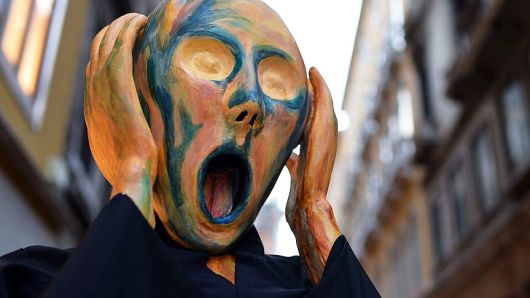
The market’s so-called fear index is ticking up as we enter what’s historically been the rockiest month of the year for stocks.
The CBOE Volatility Index, known as the VIX, spiked as much as 9.5 percent on Tuesday near a session high of 14.35. The index, which is used to measure expected volatility in the stock market over the next 30 days, was close to its highest level since August 16. A low reading means relative calm in the markets while a higher number shows more uncertainty.
September has been the worst performing month of the year for the Dow Jones Industrial Average and the S&P 500 since 1950, the worst for the Nasdaq since 1971, and the toughest for the Russell 1000 and Russell 2000 since 1979, according to data from “Stock Trader’s Almanac.”
In a note to clients this week, technical analyst Andrew Thrasher also pointed to the seasonal downturn, and said September “has historically seen more weakness in mid-term election years than non-mid-term years.”
The fear index usually moves inversely to the S&P 500, and U.S. stocks opened lower Tuesday as trade tensions between the U.S. and key partners increased.
Traders had been heavily short the VIX, meaning they are betting against its rise and by extension looking for the stock market to continue its positive run.
Stocks,in their longest bull run since World War II, have shrugged of worries over a trade war and geopolitical tensions. August’s 3 percent S&P gain was the best performance for the month in four years.
Still, the odds that something could jolt the bull run are increasing. Topping the list are the threat of another $200 billion in U.S. tariffs on Chinese goods and the November U.S. midterm elections. September is also when the Fed is next expected to raise interest rates, and a post-meeting statement and comments from Fed Chairman Jerome Powell on Sept. 26 could signal how strongly the Fed views its forecast for a December hike.
Jim Paulsen of the Leuthold Group thinks the economy may show signs of topping out soon and that could roil markets.
“Now that the Dog Days of Summer are officially over, we suspect a new narrative may take prominence in the financial markets,” Paulsen said in a note to clients Tuesday. “Rather than Presidential tweets, mid-term elections, trade wars, and impeachment proceedings dominating Wall Street discussions, expect the focus to return to the economy. A set of reports hinting at slower economic growth, an inflation spurt, or perhaps a little of both could quickly bring a new era of failing fundamentals.”

